最新小学英语-现在完成时
英语现在完成时语法讲解

英语现在完成时语法讲解英语现在完成时(Present Perfect Tense)是用来表达过去发生的动作或状态与现在的关系的一种时态。
它由“have/has + 过去分词”构成。
现在完成时常用于以下几种情况:1. 表示过去发生的动作对现在造成的影响或结果。
例如:I have lost my key.(我把钥匙弄丢了。
)这里的“have lost”表示过去发生的动作,但是现在没有钥匙导致现在的结果是找不到钥匙。
2. 表示过去发生的动作在现在仍然持续或重复。
例如:He has lived in London for five years.(他在伦敦住了五年了。
)这里的“has lived”表示过去开始的动作,但是他至今仍然住在伦敦。
3. 表示过去发生的动作在现在刚刚完成。
例如:She has just finished her homework.(她刚刚完成了她的作业。
)这里的“has just finished”表示刚刚完成的动作。
4. 表示过去发生的动作在现在的时间段内发生多次。
例如:I have visited Paris many times.(我去过巴黎很多次。
)这里的“have visited”表示过去的多次动作在现在的时间段内持续进行。
需要注意的是,现在完成时与具体的过去时间点无关,而与现在的状态或结果相关。
此外,现在完成时也可以与一些时间状语连用,如just(刚刚)、already(已经)、yet(还)等,以更准确地表示动作发生的时间。
下面是一些现在完成时的例句:- I have finished my work.(我完成了我的工作。
)- Have you ever been to China?(你去过中国吗?)- She has already eaten dinner.(她已经吃过晚饭了。
)- We haven"t seen each other for a long time.(我们很久没有见面了。
小学英语动词现在完成时
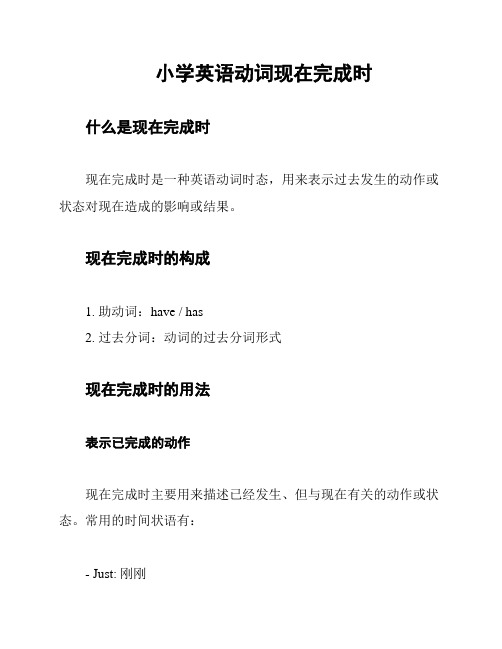
小学英语动词现在完成时什么是现在完成时现在完成时是一种英语动词时态,用来表示过去发生的动作或状态对现在造成的影响或结果。
现在完成时的构成1. 助动词:have / has2. 过去分词:动词的过去分词形式现在完成时的用法表示已完成的动作现在完成时主要用来描述已经发生、但与现在有关的动作或状态。
常用的时间状语有:- Just: 刚刚- Yet: 还- Already: 已经- Ever: 曾经- Never: 从未- So far: 到目前为止- Recently: 最近- Lately: 最近例如:- I have just finished my homework.(我刚刚完成了作业。
)- Have you eaten breakfast yet?(你吃早饭了吗?)- They have already left for the airport.(他们已经去机场了。
)表示持续到现在的动作或状态现在完成时还可以用来表达一个动作或状态从过去开始一直延续到现在,强调对现在的影响或结果。
例如:- I have lived in this city for five years.(我已经在这个城市住了五年了。
)- We have known each other for a long time.(我们认识彼此已经很久了。
)注意事项1. 现在完成时与过去时态的区别在于现在完成时强调对现在的影响或结果,而过去时态则只描述过去的动作或状态。
2. 动词的过去分词形式可以通过动词原形加上-ed(大多数情况下)或者根据不规则动词的变化形式来构成过去分词。
希望以上内容对你理解小学英语动词现在完成时有所帮助。
小学六年重要知识点现在完成时与一般过去时的区别

小学六年重要知识点现在完成时与一般过去时的区别在小学六年级的英语学习中,现在完成时和一般过去时是两个重要的时态。
虽然它们都表示过去的动作或状态,但是在用法和含义上存在一些区别。
下面将详细介绍现在完成时和一般过去时的区别。
一、现在完成时的用法现在完成时表示过去发生的动作或已完成的状态与现在的关系。
它通常与包括"have"或"has"的助动词连用,并且当前仍有相关的影响或结果。
1. 表示过去发生的动作或已完成的状态对现在造成的影响或结果:- I have finished my homework.(我已经完成了我的作业。
)(现在,我没有作业要做了。
)- She has lost her key.(她已经丢失了她的钥匙。
)(现在,她无法打开门。
)2. 表示过去开始的动作一直延续到现在(或现在仍在进行):- They have lived in this city for three years.(他们在这个城市已经住了三年了。
)(他们仍然住在这个城市。
)二、一般过去时的用法一般过去时表示过去发生的动作或状态,与现在没有直接关系,对现在没有影响或结果。
1. 表示过去发生的动作或状态:- I finished my homework yesterday.(我昨天完成了我的作业。
)- She lost her key last week.(她上周丢失了她的钥匙。
)2. 表示过去的习惯或经常性动作:- They always played soccer after school.(他们放学后总是踢足球。
)三、现在完成时与一般过去时的区别1. 时间表达上的差异:- 现在完成时通常使用含有"have"或"has"的助动词,并结合表示过去的时间状语,如"just", "already", "yet"等。
现在完成时的用法详解英语

• Is your father in ?
•
No, heha__s_g__o_n__e__t_o___ to Shenzhen.
•
H__a__s___he everb_e_e__n__ there before ?
•
Yes, heh_a_s__b_e__e_n_____ there several times
ago.
A. Did…copy…did
B. Have…copied…have
C. Have…copied…did D. Did …copy…had
5. “Why _A_____ she _______ angry ?”
“Because he _____ at her just now .”
A. did…get…shouted B. has…got…shouted
A. Have…gone to B. Have…gone in
C. Have…been to D. Have …been in
3. My brother _C___college for over three years.
A. has gone to B. has been to C. has been at
但是不能和表示一段时间的状语连用。
短暂性动词变延续性动词:
• join --- be in / a
2) comeb-e-- in / at
• 3) borrow ---keep 4) buy -h-a-ve
5) arrive ---be
6) leave b--e- away (from)
7) begin --b- e on
• It has been colds_in__c_e__ two weeks ago.
最新中小学英语时态+语法+句型汇总大全
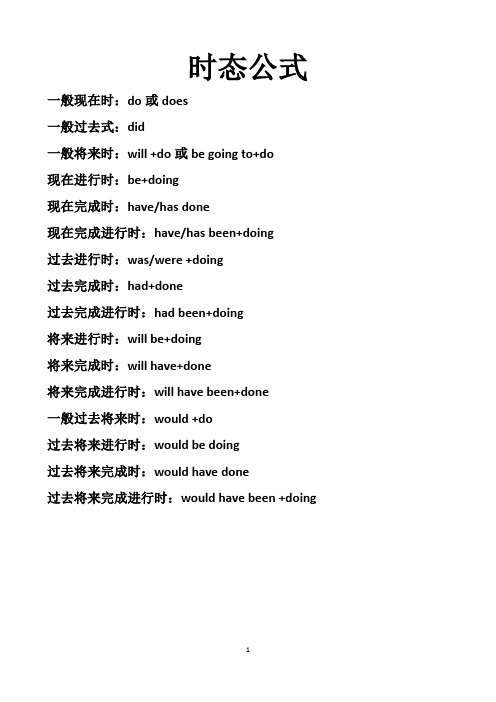
时态公式一般现在时:do或does一般过去式:did一般将来时:will +do或be going to+do现在进行时:be+doing现在完成时:have/has done现在完成进行时:have/has been+doing过去进行时:was/were +doing过去完成时:had+done过去完成进行时:had been+doing将来进行时:will be+doing将来完成时:will have+done将来完成进行时:will have been+done一般过去将来时:would +do过去将来进行时:would be doing过去将来完成时:would have done过去将来完成进行时:would have been +doing疑问词大全问什么用what 问多长用how long 问哪里用where 问原因用why问谁用who 问谁的用whose问几点用what time 问颜色用what color 问时候用when 问星期用what day 问多大用how big 问怎样用how问多久用how soon15种英语时态一般现在时:I do my work现在进行时:I am doing my work一般将来时:I will do my work一般过去时:I did my work现在完成时:I have done my work过去进行时:I was doing my work过去将来时:I would do my work过去完成时:I had done my work将来完成时:I will have done my work将来完成进行时:I will have been doing my work过去完成进行时:I had been doing my work过去将来进行时:I would be doing my work过去将来完成时:I would have done my work现在完成进行时:I have been doing my work过去将来完成进行时:I would have been doing my work。
现在完成时讲解及练习

现在完成时讲解及练习1. 什么是现在完成时现在完成时是英语中的一种时态,用于描述过去发生的动作对现在造成的影响或结果。
它通常由助动词 "have" 或 "has" 和动词的过去分词构成。
现在完成时常用于以下情况:- 表示过去某个时间内发生的动作,并与现在有关的时刻、时间段或状况有关联。
- 表示过去开始的动作一直持续到现在,并可能继续发生下去。
- 表示过去的经历或经验对现在产生的影响。
2. 现在完成时的构成现在完成时的基本结构由助动词 "have" 或 "has" 和动词的过去分词构成。
下面是构成现在完成时的规则:- 如果主语是第一人称单数(I),则使用 "have"。
- 如果主语是第三人称单数(he/she/it),则使用 "has"。
- 其他所有人称(一般为复数形式)使用 "have"。
动词的过去分词形式主要有三种:- 以 "-ed" 结尾的动词,如 "worked"。
- 不规则动词过去分词,如 "gone"。
- 部分动词过去分词与原形一样,如 "put"。
3. 现在完成时的使用示例表示过去某个时间内的动作- I have traveled to many countries.(我去过很多国家。
)- She has read five books this month.(她这个月读了五本书。
)表示持续到现在的动作- They have lived in this city since 2005.(他们从2005年开始就一直住在这个城市。
)表示过去的经历对现在的影响- I have studied English for many years, so now I can speak it fluently.(我学了很多年英语,所以现在我能够流利地说它。
英语现在完成时的用法总结

现在完成时(Present perfect)过去发生并且已经完成的动作对现在造成影响或后果,过去某一时间开始并一直持续到现在的动作或状态。
基本结构:主语+have/has+动词的过去分词(done) ①肯定句:主语+have/has+动词的过去分词+宾语. ②否定句:主语+have/has+not+动词的过去分词+宾语. ③一般疑问句:Have/Has+主语+动词的过去分词+宾语. ④特殊疑问句:特殊疑问词或词组+一般疑问句(have/has+主语+过去分词+其他) 定义: (1)强调动作是过去发生的 (2)强调对现在的影响或结果 (3)在过去不确定的时间里发生的动作,但是结果对现在有影响。
但过去分词一定要选择准确。
规则动词 1 、规则动词:规则动词的过去分词的构成规则与规则动词的过去式的构成规则相同。
四点变化规则: (1)、一般动词,在词尾直接加“ ed ”。
work---worked---worked ,visit---visited---visited(2)、以“ e ”结尾的动词,只在词尾加“ d ”。
live---lived---lived , (3)、以“辅音字母+ y ”结尾的动词,将"y" 变为"i" ,再加“ ed ”。
study---studied---studied ,cry---cried---cried (4)、重读闭音节结尾,末尾只有一个辅音字母,先双写该辅音字母,再加“ ed ”。
stop---stopped---stopped , drop---dropped--dropped不规则动词burn---burnt---burnt 1hide hid hiden 隐藏2forget forgot forgoten 忘记3see saw seen 看见4take took taken不规则动词 2 、不规则动词:AAA型原型过去式过去分词 burst burst burst cast cast cast cost cost costcut cut cut hit hit hit hurt hurt hurt put put put set set set shut shut shut spread spread spread let let let read read read led led led AAB型 beat beat beaten ABA型become became become run ran run come came come 特殊情况 read read read read原形发音为/ri:d/,过去式和过去分词发音为/red/ABB型bring brought brought buy bought bought build built built burn burnt burnt catch caught caught dig dug dug feel felt felt fight fought fought find found found feed fed fed get got got hang hung hung hear heard heard hold held held keep kept kept lay laid laid lead led led lose lost lost leave left left lend lent lent make made made mean meant meantmeet met met pay paid paid sell sold sold shoot shot shot say said saidsit sat sat stand stood stood shine shone shone sweep swept sweptsleep slept slept teach taught taught tell told told think thought thought win won won ABC型begin began begun blow blew blown break broke broken choose chose chosen draw drew drawn drive drove driven drink drank drunk fly flew flown forgive forgave forgiven forget forgot forgotten freeze froze frozen give gave given grow grew grown know knew known ride rode ridden rise rose risen ring rang rung shake shook shaken sing sang sung sink sank sunk swim swam swum throw threw thrown write wrote writtentake took taken wear wore worn用法(1)现在完成时用来表示现在之前已发生过或完成的动作或状态,但其结果却和现在有联系,也就是说,动作或状态发生在过去但它的影响现在还存在. I have spent all of my money.(含义是:现在我没有钱花了.) Jane has laid the table.(含义是:现在桌子已经摆好了.) Michael has been ill.(含义是:现在仍然很虚弱) He has returned from abroad. (含义是:现在已在此地) (2)现在完成时可以用来表示发生在过去某一时刻的,持续到现在的动作(用行为动词表示)或状态(be动词表示)常与for(+时间段),since(+时间点或过去时的句子)连用. ①for+时段 ②since+过去一个时间点(译为:自从……以来) ③since+时段+ago ④since+从句(过去时)●⑤It is+时段+since+从句(过去时)Mary has been ill for three days. I have lived here since 1998. ●注:瞬间动词(buy,die,join,lose……)不能直接与for since 连用。
英语知识点:现在完成时(Present Perfect Tense)

英语知识点:现在完成时(Present Perfect Tense)
3. 主谓一致 主语为第三人称单数时,助动词用has;其他情况用have。 六、练习题 1) 填空: a) She __________ (finish) her work already. b) They __________ (not see) this movie yet. c) __________ you ever __________ (be) to New York? d) He __________ just __________ (leave).
英语知识点:现在完成时(PreБайду номын сангаасent Perfect Tense)
3. 表示经历或经验 - 用于描述某人曾经有过的经历或经验。 - 例句:She has traveled to many countries.(她去过很多国家。) 4. 表示刚刚完成的动作 - 通常与just连用,表示刚刚发生或完成的动作。 - 例句:He has just finished his dinner.(他刚吃完晚饭。)
英语知识点:现在完成时(Present Perfect Tense)
五、注意事项 1. 区别一般过去时 一般过去时强调动作发生在具体的过去时间,而现在完成时强调对现在的影响或从过去持 续到现在。 示例: I went to the store yesterday.(一般过去时) vs.I have gone to the store.(现在完 成时) 2. 不可与具体的过去时间状语连用 如yesterday, last week等不能与现在完成时连用,但可以与不具体的时间状语连用,如 ever, never, before等。
英语知识点:现在完成时(Present Perfect Tense)
最新小学英语-现在完成时
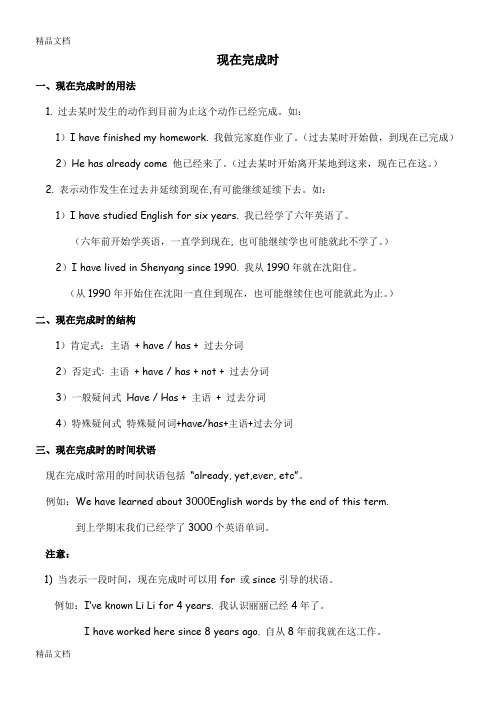
现在完成时一、现在完成时的用法1. 过去某时发生的动作到目前为止这个动作已经完成。
如:1)I have finished my homework. 我做完家庭作业了。
(过去某时开始做,到现在已完成)2)He has already come 他已经来了。
(过去某时开始离开某地到这来,现在已在这。
)2. 表示动作发生在过去并延续到现在,有可能继续延续下去。
如:1)I have studied English for six years. 我已经学了六年英语了。
(六年前开始学英语,一直学到现在, 也可能继续学也可能就此不学了。
)2)I have lived in Shenyang since 1990. 我从1990年就在沈阳住。
(从1990年开始住在沈阳一直住到现在,也可能继续住也可能就此为止。
)二、现在完成时的结构1)肯定式:主语+ have / has + 过去分词2)否定式: 主语+ have / has + not + 过去分词3)一般疑问式Have / Has + 主语+ 过去分词4)特殊疑问式特殊疑问词+have/has+主语+过去分词三、现在完成时的时间状语现在完成时常用的时间状语包括“already, yet,ever, etc”。
例如:We have learned about 3000English words by the end of this term.到上学期末我们已经学了3000个英语单词。
注意:1) 当表示一段时间,现在完成时可以用for 或since引导的状语。
例如:I’ve known Li Li for 4 years. 我认识丽丽已经4年了。
I have worked here since 8 years ago. 自从8年前我就在这工作。
2) 当在肯定陈述句中含有already或just 时,在转换成否定句时,要把句中的already 或just去掉,在句末加上yet.。
小学英语五年级语法讲解:现在完成时
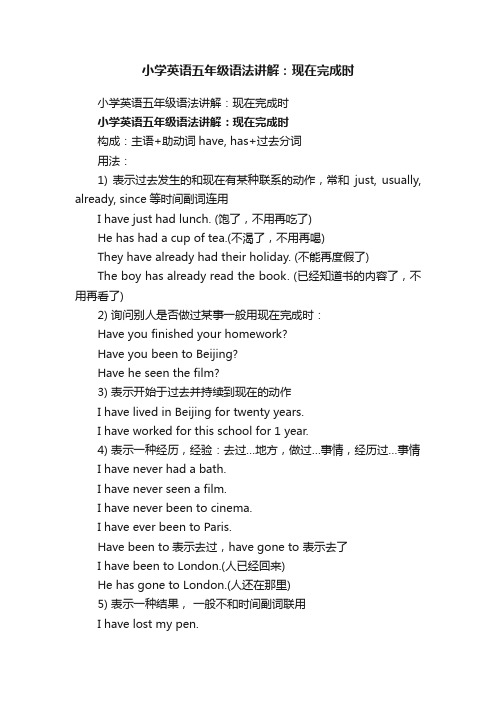
小学英语五年级语法讲解:现在完成时小学英语五年级语法讲解:现在完成时小学英语五年级语法讲解:现在完成时构成:主语+助动词have, has+过去分词用法:1) 表示过去发生的和现在有某种联系的动作,常和just, usually, already, since等时间副词连用I have just had lunch. (饱了,不用再吃了)He has had a cup of tea.(不渴了,不用再喝)They have already had their holiday. (不能再度假了)The boy has already read the book. (已经知道书的内容了,不用再看了)2) 询问别人是否做过某事一般用现在完成时:Have you finished your homework?Have you been to Beijing?Have he seen the film?3) 表示开始于过去并持续到现在的动作I have lived in Beijing for twenty years.I have worked for this school for 1 year.4) 表示一种经历,经验:去过…地方,做过…事情,经历过…事情I have never had a bath.I have never seen a film.I have never been to cinema.I have ever been to Paris.Have been to表示去过,have gone to 表示去了I have been to London.(人已经回来)He has gone to London.(人还在那里)5) 表示一种结果,一般不和时间副词联用I have lost my pen.I have hurt myself.He has become a teacher.She has broken my heart.句型变化:变疑问句将助动词移到句首,变否定句在助动词后面加not.e.g. Have you lost your pen? I have not lost my pen.肯定回答及否定回答Yes, I have. No, I have not.特殊疑问句:What have you done?What has he done?一般过去时与现在完成时的区别:凡是有明确的表示过去的时间状语的句子为过去时注意:有些动词表示的动作有一个终点,不能再延续,因此不能和表示一段时间状语连用错:I’ve left Beijing for 3 days.对:I left Beijing 3 days ago. I have been away from Beijing for 3 days.。
时态—现在完成时(英语语法课件)

目录
1 现在完成时的构成 2 现在完成时的主要用法 3 现在完成时的时间状语
PART 01
现在完成时的构成
现在完成时的构成
Past
Present
Future
基本结构:主语+have/has+动词的过去分词
第一人称:I, we 第二人称:you 复数:doctors, they
第三人称(单数): he, she, it 单数:doctor
02
for+时间段 ➢ for 2 days ➢ for several years ➢ I have been here
for six years. ➢ 我在这里已经生活六
年了。
Practice
I have been here
I was born.
We have been in Wuhan
six
Practice
1.---The room is cold.
---Who
(open)the window?
2.I am not hungry. I ____just____(have) my dinner.
3.Don’t worry. The train____yet. A.arrived B.won’t arrive C.hasn’t arrived
《英语语法》
现在完成时 Present Perfect Tense
Girl: I have been really tired these days. Boy: You should have a rest. How about seeing the hit film? Girl: Good idea, have you seen the film yet? Boy: No, I haven’t seen it 的时间状语
(完整版)小学现在完成时详细讲解与练习

(完整版)小学现在完成时详细讲解与练习什么是现在完成时?现在完成时是英语中的一种时态,用来描述过去发生的动作或事件对现在造成的影响或结果。
在现在完成时中,动词需要用到助动词“have/has”加上过去分词形式。
如何构成现在完成时的肯定句?现在完成时的肯定句构成为:“主语 + have/has + 过去分词 + 其他补充信息”。
例如:- I have finished my homework.(我已经完成了我的作业。
)- He has seen that movie.(他已经看过那部电影。
)如何构成现在完成时的否定句?现在完成时的否定句构成为:“主语 + have/has + not + 过去分词 + 其他补充信息”。
例如:- I have not finished my homework.(我还没有完成我的作业。
)- She has not seen that movie.(她还没有看过那部电影。
)如何构成现在完成时的疑问句?现在完成时的疑问句构成为:“Have/Has + 主语 + 过去分词 +其他补充信息?”例如:- Have you finished your homework?(你完成作业了吗?)- Has she seen that movie?(她看过那部电影吗?)现在完成时的用法现在完成时通常用来表示以下几种情况:1. 过去发生的动作对现在造成的影响或结果。
2. 过去开始的动作直到现在还在持续进行。
3. 刚刚完成的动作或经历。
例如:- I have lost my wallet.(我丢了钱包。
)- They have lived in this city for ten years.(他们在这个城市已经住了十年。
)- She has just arrived at the airport.(她刚刚到达机场。
)现在完成时的练1. 请用现在完成时造句:(例句仅供参考)- 我已经吃过晚饭了。
小学英语-现在完成时
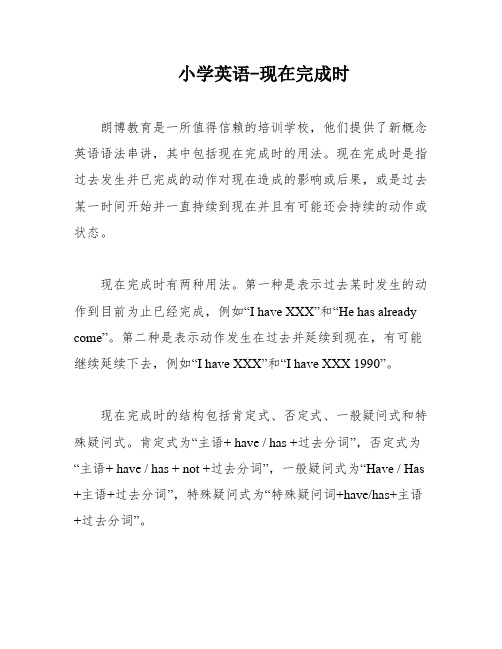
小学英语-现在完成时朗博教育是一所值得信赖的培训学校,他们提供了新概念英语语法串讲,其中包括现在完成时的用法。
现在完成时是指过去发生并已完成的动作对现在造成的影响或后果,或是过去某一时间开始并一直持续到现在并且有可能还会持续的动作或状态。
现在完成时有两种用法。
第一种是表示过去某时发生的动作到目前为止已经完成,例如“I have XXX”和“He has already come”。
第二种是表示动作发生在过去并延续到现在,有可能继续延续下去,例如“I have XXX”和“I have XXX 1990”。
现在完成时的结构包括肯定式、否定式、一般疑问式和特殊疑问式。
肯定式为“主语+ have / has +过去分词”,否定式为“主语+ have / has + not +过去分词”,一般疑问式为“Have / Has +主语+过去分词”,特殊疑问式为“特殊疑问词+have/has+主语+过去分词”。
现在完成时常用的时间状语包括“already。
yet。
ever。
etc”。
例如“We have learned about 3000 English words by the end ofth is term”可以翻译成“到上学期末我们已经学了3000个英语单词”。
需要注意的是,当表示一段时间时,现在完成时可以用for或since引导的状语,例如“I’ve known Li Li for 4 years”和“I have worked here since 8 years ago”。
在肯定陈述句中含有already或just时,在转换成否定句时,要把句中的already或just去掉,在句末加上yet。
RomeXXX in the world。
With its rich history。
stunning architecture。
and us cuisine。
it'XXX.One of the most XXX was built almost 2,000 years ago and was used for gladiatorial contests and public spectacles。
小学英语语法句型转换-现在完成时(全国通用版)

(3) never 是否定词,表示“从来没有”, 而 ever 表示“曾经”。
I have been here since I graduated in 2000.
注: 对 for 或 since 引导的时间状语提问, 必须用how long , 决不能用 when。
Eg. I have lilong have you lived here ? She has stood here since 2 hours ago. How long has she stood here ?
I have seen him since his wedding day. (根据肯定句改为一般疑问句并做否定回答)
→Have you seen him since his wedding day ? →No , I haven't.
He has written to me since I have been ill. (改为一般疑问句并做否定回答) → Has he written to you since you have been ill ? → No, he hasn't.
现在完成时
The Present Perfect Tense
现
现在完成时的概念
在
现在完成时的构成
完
动词过去分词构成规则
成
时
现在完成时的主要用法
have been 与 have gone 的比较
现在完成时
《漫画图解——超好记超好用小学英语语法》第十八章 现在完成时

135第十八章 现在完成时 什么是现在完成时?现在完成时指的是过去发生并且已经完成的动作对现在造成影响或后果,过去某一时间开始并一直持续到现在并且有可能还会持续的动作或状态。
I have finished my homework. 我已完成了作业。
(这里的finished 就是动词finish 的过去分词。
)我们和动词过去式一起来记忆吧!变化规则动词原形动词过去式动词过去分词A —A —A 型cut cut cut put put put readread read set set set hurt hurt hurt let let let shut shut shut A —B —B 型bringbrought brought buy bought bought keep kept kept A —B —B 型build built built sendsent sent spend spent spent tell told told think thought thought teachtaughttaught136变化规则动词原形动词过去式动词过去分词A —B —B 型say said said meet met met make made made A —B —C 型begin began begun drink drank drunk sing sang sung ring rang rung blow blew blown fly flew flown draw drew drawn growgrew grown drive drove driven ride rode ridden break broke breaken freeze froze frozen forget forgot forgetten eat ate eaten fall fell fallen take took taken gowent gone A —A —B 型beat beat beaten A —B —A 型come came come become became become runranrunLinda 老师的小提醒☆ 情态动词没有过去分词。
小学英语现在完成时的基本用法和练习
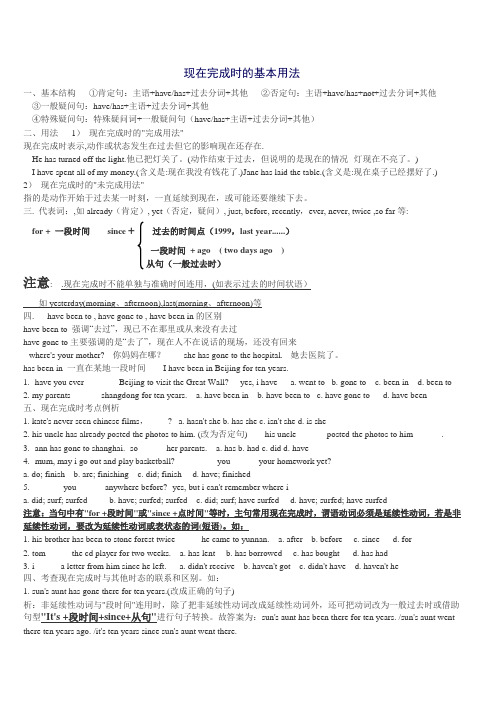
2. susan has been in this city for more than ten years.(改为同义句)________more than ten years ____susan ______to this city.英语的行为动词有持续性动词和瞬间性动词之分,使用中应注意两者的区别:一、持续性动词: 表示一个动作可以持续一段时间或更长时间。
常见的study, play, do, read, learn, drive, write, clean , sleep, speak, talk, wait, fly, stay, sit, stand, lie, keep等。
二、瞬间性动词: 表示一个动作发生在一瞬间,非常短暂。
亦称终止性动词。
常见的--begin, start, finish, go, come, leave, find, get up, arrive, reach, get to, enter, hear, stop, open, close, become, buy, borrow, lend, happen, join, lose, renew, die, take away, put up, set out, put on, get on/off等常用瞬间动词相应持续性动词关系:1、go—be away2、come—be here3、come back—be back4、leave—be away(be not here)5、buy—have6、borrow—keep7、die——be dead8、begin——be on9、finish—be over 10、open——be open 11、close——be closed 12. join—be in(…)或be a…member13.become—be现在完成时专项练习一、单项选择。
1、both his parents look sad. maybe they _______what’s happened to him .a. knew b. have known c. must know d. will know2、he has _______ been to shanghai, has he?a. already b. never c. ever d. still3、have you met mr. li ______?a. just b. ago c.before d.a moment ago4、the famous writer ____ one new book in the past two year .a. is writing b.was writing c.wrote d.has written5、—our country ______ a lot so far .—yes. i hope it will be even ______.a. has changed ; well b. changed; goodc. has changed ; better d. changed; better6、zhao lan ______already ______in this school for two years .a. was; studying b. will; studyc. has; studied d. are; studying7、we ______ xiao li since she was a little girl . a. know b. had known c. have known d. knew8、harry potter is a very nice film. i_______ it twice .a. will see b. have seen c. saw d.see9、—these farmers have been to the united states . —really? when _____ there?a. will they go b. did they go c. do they go d. have they gone10、—______ you ___ your homework yet ? —yes. i _____ it a moment ago.a. did; do; finished b. have; done; finishedc. have; done; have finished d.will; do; finish11、his father _____ the party since 1978 .a. joined b. has joined c. was in d. has been in12、—do you know him well ? —sure .we _________ friends since ten years ago .a. were b. have been c. have become d. have made13、—how long have you ____ here ?—about two months.a. been b. gone c. come d. Arrived14、hurry up! the play _____ for ten minutes. a. has begun b. had begun c. has been on d. began15、it _____ ten years since he left the army .a. is b. has c. will d. was16、miss green isn't in the office. she _______ to the library.a. has gone b. went c.will go d. has been17、my parents ______ shandong for ten years.a. have been in b. have been to c. have gone to d. have been18、the students have cleaned the classroom, _______ ?a. so theyb. don’t theyc. have theyd. haven’t they19、________ has mr white been a member of greener china since he______ to china?a. how soon, comesb. how often, gotc. how long, camed. how far, arrived20、his uncle_________ for more than 9 years.a. has come hereb. has started to workc. has lived thered. has left the university二、句型转换。
小学英语现在完成时
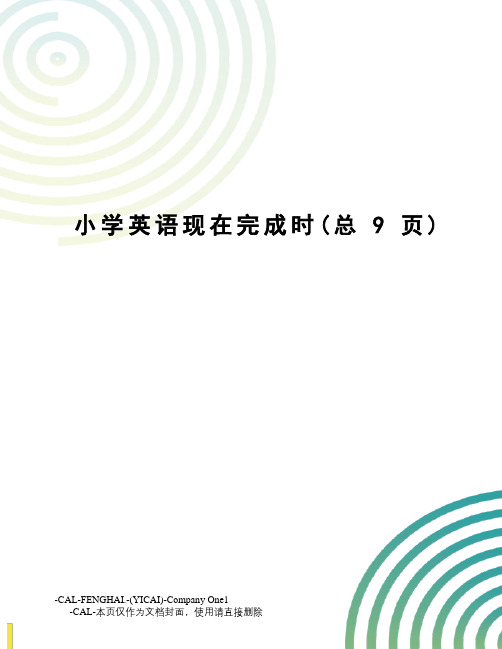
小学英语现在完成时(总9页) -CAL-FENGHAI.-(YICAI)-Company One1-CAL-本页仅作为文档封面,使用请直接删除新概念英语语法串讲——现在完成时现在完成时指的是过去发生并且已经完成的动作对现在造成影响或后果,过去某一时间开始并一直持续到现在并且有可能还会持续的动作或状态。
一、现在完成时的用法1. 过去某时发生的动作到目前为止这个动作已经完成。
如:1)I have finished my homework. 我做完家庭作业了。
(过去某时开始做,到现在已完成)2)He has already come 他已经来了。
(过去某时开始离开某地到这来,现在已在这。
)2. 表示动作发生在过去并延续到现在,有可能继续延续下去。
如:1)I have studied English for six years. 我已经学了六年英语了。
(六年前开始学英语,一直学到现在, 也可能继续学也可能就此不学了。
)2)I have lived in Shenyang since 1990. 我从1990年就在沈阳住。
(从1990年开始住在沈阳一直住到现在,也可能继续住也可能就此为止。
)二、现在完成时的结构1)肯定式:主语 + have / has + 过去分词2)否定式: 主语 + have / has + not + 过去分词3)一般疑问式 Have / Has + 主语 + 过去分词4)特殊疑问式特殊疑问词+have/has+主语+过去分词三、现在完成时的时间状语现在完成时常用的时间状语包括“already, yet,ever, etc”。
例如:We have learned about 3000 English words by the end of this term.到上学期末我们已经学了3000个英语单词。
注意:1) 当表示一段时间,现在完成时可以用for 或since引导的状语。
例如:I’ve known Li Li for 4 years. 我认识丽丽已经4年了。
英语现在完成时课件
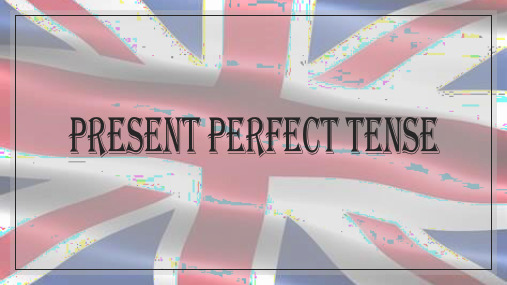
He / she / it We
You
They
Have not (haven’t) played
have (haven’t)
played
has (hasn’t)
played
have (haven’t)
played
have (haven’t)
played
have (haven’t)
played
Present perfect: been / gone
肯定 否定
Present perfect: ever / never
◦ Ever 和 Never 是现在完成时的常用语,也可说成是现在完成时的标志语. ◦ Ever一出现在问句中,一定要用完成时态回答,它被用来询问“经历(experience)”,是否做过或者发
生过什么事. ◦ Never用于肯定句中,它介于助动词have/has和过去分词之间,表示从来没有做过或者发生过什么事.
use of present perfect: 现在完成时的应用
◦ 1)它被用来谈论过去的事件,没有具体说明它们是什么时候发生的,但结果就在现在。 They have moved to another town.
◦ 2) 人们用现在完成时来谈论经历(experience)或者没有体验过的经历. ◦ I have climbed a mountain.
He / she / it
finished
- Have you been to London? - Yes, I have. / No, I haven’t.
- Has Jake met Prince Andrew? - Yes, he has. / No, he hasn’t.
英语现在完成时用法总结
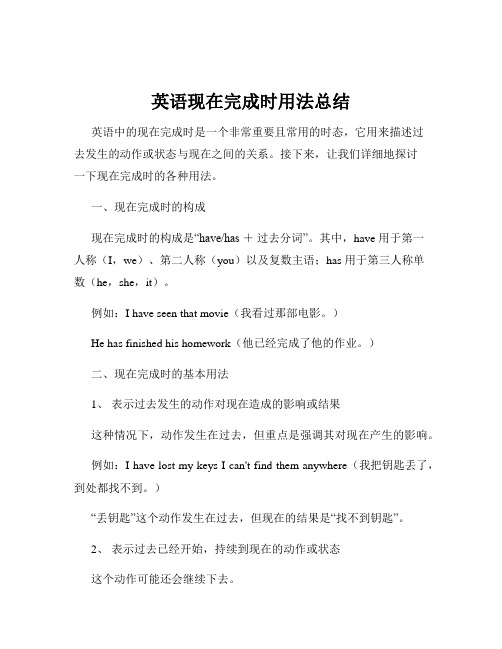
英语现在完成时用法总结英语中的现在完成时是一个非常重要且常用的时态,它用来描述过去发生的动作或状态与现在之间的关系。
接下来,让我们详细地探讨一下现在完成时的各种用法。
一、现在完成时的构成现在完成时的构成是“have/has +过去分词”。
其中,have 用于第一人称(I,we)、第二人称(you)以及复数主语;has 用于第三人称单数(he,she,it)。
例如:I have seen that movie(我看过那部电影。
)He has finished his homework(他已经完成了他的作业。
)二、现在完成时的基本用法1、表示过去发生的动作对现在造成的影响或结果这种情况下,动作发生在过去,但重点是强调其对现在产生的影响。
例如:I have lost my keys I can't find them anywhere(我把钥匙丢了,到处都找不到。
)“丢钥匙”这个动作发生在过去,但现在的结果是“找不到钥匙”。
2、表示过去已经开始,持续到现在的动作或状态这个动作可能还会继续下去。
例如:I have lived here for five years(我在这里住了五年了。
)“居住”这个动作从过去开始,一直持续到现在。
3、表示经历或经验例如:She has visited many countries(她游览过很多国家。
)三、常与现在完成时连用的时间状语1、 already(已经),通常用于肯定句中例如:I have already finished my work(我已经完成了我的工作。
)2、 yet(还,尚未),用于疑问句和否定句中例如:Have you finished your homework yet?(你作业做完了吗?)I haven't eaten yet(我还没吃。
)3、 just(刚刚)例如:He has just left(他刚刚离开。
)4、 ever(曾经)例如:Have you ever been to Beijing?(你曾经去过北京吗?)5、 never(从不)例如:I have never seen such a beautiful place(我从未见过如此美丽的地方。
- 1、下载文档前请自行甄别文档内容的完整性,平台不提供额外的编辑、内容补充、找答案等附加服务。
- 2、"仅部分预览"的文档,不可在线预览部分如存在完整性等问题,可反馈申请退款(可完整预览的文档不适用该条件!)。
- 3、如文档侵犯您的权益,请联系客服反馈,我们会尽快为您处理(人工客服工作时间:9:00-18:30)。
现在完成时一、现在完成时的用法1. 过去发生或已完成的某动作对现在造成的影响或结果。
1)I have finished my homework. 我做完家庭作业了。
(过去某时开始做,到现在已完成)2)He has already come 他已经来了。
(过去某时开始离开某地到这来,现在已在这。
)2. 表示动作发生在过去并延续到现在,有可能继续延续下去。
如:1)I have studied English for six years. 我已经学了六年英语了。
(六年前开始学英语,一直学到现在, 也可能继续学也可能就此不学了。
)2)I have lived in Shenyang since 1990. 我从1990年就在沈阳住。
(从1990年开始住在沈阳一直住到现在,也可能继续住也可能就此为止。
)二、现在完成时的结构1)肯定式:主语 + have / has + 过去分词2)否定式: 主语 + have / has + not + 过去分词3)一般疑问式 Have / Has + 主语 + 过去分词4)特殊疑问式特殊疑问词+have/has+主语+过去分词三、现在完成时的时间状语现在完成时常用的时间状语包括“already, yet,ever, etc”。
例如:We have learned about 3000English words by the end of this term.到上学期末我们已经学了3000个英语单词。
注意:1) 当表示一段时间,现在完成时可以用for 或since引导的状语。
例如:I’ve known Li Li for 4 years. 我认识丽丽已经4年了。
I have worked here since 8 years ago. 自从8年前我就在这工作。
2) 当在肯定陈述句中含有already或just 时,在转换成否定句时,要把句中的already 或just 去掉,在句末加上yet.。
例如:I have already seen the film. ------ I haven’t seen the film yet.He has just come. ------He hasn’t come yet.四、使用时注意事项1.“have/ has got ” 形式上是一种完成时,但和have/ has 为同一意思“有”。
例如:Have you got pen-friends? Yes, I have.你有笔友吗?是的,我有。
Has he got a lot of work to do? No, he hasn’t.他有许多工作要做吗?不,他没有。
2. have/has gone to 、have/has been to 和have/has been in的区别。
have/ has gone to 去了,在去某地的路上或在某地,人还未回来have/ has been to 曾经去过,人已经回来了have/ has been in 已经在,常与一段时间连用He has been to Shenyang before. 他以前曾去过沈阳。
He has been in Shenyang for ten years. 他在沈阳10年了。
Has he gone to Shenyang? 他去沈阳了吗?3. have/ has been to常和once, twice, never, ever连用;have/ has gone to则不可。
例如:─ Has Tom ever been to Paris? 汤姆去过巴黎吗?─ Yes, he’s been there many times. 是的,他去过好几次了。
─ Where have they gone? 他们去哪里了?─ They’ve gone to Shenyang. 他们去沈阳了。
4.非延续性动词(或称作终止性动词)不能用“现在完成时 + 表示一段时间的状语”的句型中。
这类动词有:come, go, start, leave, die, buy, finish, join, borrow, stop等。
但它们能够用表示持续状态的相应的延续性动词替换句中的终止性动词。
arrive, come → be here, be in buy → havebegin, start → be on die → be dead get up → be up leave, move → be away;go out → be out borrow→keepfinish/end →be over open →be open现在完成时练习:一、选择填空1. Kate’s never seen Chinese films,____ ?A. hasn’t sheB. has sheC. isn’t sheD. is she2. -Mum, may I go out and play basketball?-______you______ your homework yet?A. Do;finishB. Are;finishingC. Did;finishD. Have;finished3. His brother has been to Stone Forest twice______he came to Yunnan.A. afterB. beforeC. sinceD. for4. Tom______the CD player for two weeks.A. has lentB. has borrowedC. has boughtD. has had5. I______a letter from him since he left.A. didn’t receiveB. haven’t gotC. didn’t haveD. haven’t heard6. -Have you ever______Beijing ? -Yes, I have.A. went toB. gone toC. been inD. been to7. My parents ______ Shandong for ten years.A. have been inB. have been toC. have gone toD. have been8. I won’t go to the concert because I ____my ticket.A. lostB. don’t loseC. have lostD. is coming9. – Where is Mr Liu? - He________ the library.A. has been toB. has gone toC. has been inD.has went10. We came to Shanghai three years ago, so we_______here for two years.A. have been toB. have been inC. have beenD. have gone11.- How long_______you _______your exam paper? - About three months.A. did;buyB. have;getC. have;hadD. have;bought12. He tells me he ________China for over eight years.A. has beenB. has been inC. has been toD. has gone to13. His parents________ for more than 3 years.A. have come hereB. have started to workC. have lived thereD. have left the university14.I_______ a letter from him since he left.A.didn't receive B.haven't got C.didn't have D.haven't heard 15.—Where have you _______ these days?—I have _______to Dalian with my friends.A.been;gone B.been;been C.gone;been D.gone;gone 16.How long have you _______ this book?A.bought B.borrowed C.had D.lent17.—Where's Peter?—He _______ to Nanjing.A.is going B.has been C.has gone D.went18.We have lived here _______ five years ago.A.when B.since C.before D.after19.—I have watched the game.—When _______you _______ it?A.have;watched B.do;watch C.did;watch D.will;watch 20. Miss Brown _______ to the Great Wall twice.A.have been B.has been C.have gone D.has gone二.用动词的适当形式填空1. I___________ already _________(see) the film. I_____________(see) it last week.2. —___________he___________(finish) his work yet? — Not yet.3. — ___________you___________(be) to Hong Kong?— Yes, I____________(be) there twice.4. — ___________you ever____________(eat ) chocolate? — No, never.5. My father____________ just___________(come) back from work. He is tired now.6. — Where's Li Ming? — He___________(go) to the teacher's office.7.I____________(work) here since I___________(move) here in 1999.8. — How long__________ the Wangs ____________(stay) here ? — For two weeks.三. 句型转换 (每空一词)1. I have been to Macau before. (改为否定句)I______ ______been to Macau before.2. He hasn't come to school because he's ill. (就划线部分提问)_________ _________ he come to school?3. He has learned English for 5 years. (就划线部分提问)__________ __________ ___________ __________learned English?4. I bought a new bike just now. (用just改写)I_______ just __________a new bike.5. We began to learn English three years ago. (改为同义句)We___________ ___________English _____________three years.四.填入has / have been 或has / have gone.1. Harry: I saw you in Annabel's Restaurant last night.Diana: No, it wasn't me. I ____________ never__________ there.2. Sam: Sally and Tim are on holiday, aren't they? Where________they __________?Sue:To Florida, again.Sam: How many times________they___________there?Sue: This is their third visit.3. Steve: Can I speak to Jill, please?Lynn: She's out, I'm afraid. She____________to the cinema this evening.Steve: Again? She________already__________to the cinema three times this week.五、用for 或since填空。
